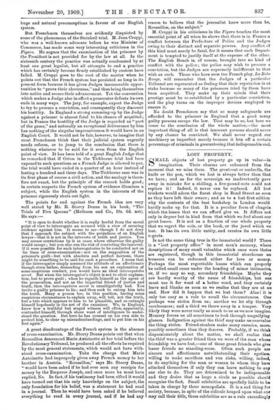FRENCH AND ENGLISH TRIALS. T HE Steinheil trial in Paris has
left as its legacy a deep and perhaps insoluble problem of undetected crime, a very curious study in psychology, and a public discussion on the merits of the French system of justice. We rather sympathise with the opinion of certain intelligent French- men that a trial of this sort gets an unearned increment of sensation merely because of its delays. In England no such interval would have been allowed to elapse between the arrest and the trial of the prisoner, and public curiosity would not have worked itself up to so singular a pitch. One can think of many notorious murder trials in England about which public excitement would have been enormously aggravated if the trial had been held in suspense month after month. Madame Steinheil's state of mind—the mental incoherence and up- heaval which caused her to charge three persons with the crime of murdering her husband and her mother, and then to cite each of those incidents as a proof of the absence from her mind of a cold and calculated design—is indeed a psycho- logical state worth examination. But it is not of that, but of the differences between French and English justice, which are commanding almost as much discussion in England as in France, that we would write now.
No Englishman can have read the reports of the trial without having his sense of what was seemly and judicial challenged, if not outraged. Accustomed to the notion that a Judge must hold himself apart from and above the wrangles of rival counsel (never intervening except in so far as it is his duty to direct the jury in his summing-up), the Englishman will have noted with something like scorn the loud personal encounters between Madame Steinheil and the President of the Cour d'Assises. The functions of the President seem, indeed, almost indistinguishable from those of the prosecutor. He often insists, it is true, upon the elucidation of points which obviously tell in the prisoner's favour, but his heart never appears to be in that part of his office ; it engages his attention perfunctorily, and be is evidently much more intent on proving the guilt of the prisoner. The very arrangement of a French Court, in which the prosecutor sits on the same bench with the Judge, while the defending counsel Bits on a lower level in the body of the Court, is symbolical of the bias directed against the prisoner. At the end of the trial the President does not even redress the balance of the evidence which he has urged against the prisoner. He does not sum up. Such are some of the impressions made by the Steinheil trial on an English mind. They are necessarily one-sided impressions, because hi this country we all come to the examination of the subject with
huge and natural preconceptions in favour of our English system.
But Frenchmen themselves are evidently disquieted by some of the phenomena of the Steinheil trial. H. Jean Cruppi, who was a well-known advocate before he was Minister of
Commerce, has made some very interesting criticisms in the Figaro. He argues that the examination of the prisoner by
the President is not provided for by the law at all. In the sixteenth century the practice was actually condemned by at least one great legalist, but all attempts to end a practice which has certainly become firmly established by custom have failed. H. Cruppi goes to the root of the matter when he points out that the French system has persisted so long in its present form because it has given Judges innumerable oppor- tunities to "prove their cleverness," and thus bring themselves into notice and secure their advancement. Yet the convention which makes a Judge also in effect a prosecutor defeats its own ends in many ways. The jury, for example, expect the Judge to try to procure a conviction, and consequently they discount his hostility. In England a strong summing-up by the Judge against a prisoner is almost fatal to his chance of acquittal; but in France the hostility of the Judge is regarded as "part of the game," and naturally an exceptional deliverance by him has nothing of the singular impressiveness it would have in an English Court. It would not be fair, however, to imagine that most Frenchmen think that their judicial system urgently needs reform, or to jump to the conclusion that there is nothing whatever to be said for it even from the English point of view. It has been told of a great English Judge that he remarked that if Orton in the Tichborne trial had been exposed to such questions as a French Judge is allowed to put, the trial would have ended in a quarter of an hour instead of lasting a hundred and three days. The Tichborne case was in its first phase of course a civil action, and the analogy is there- fore not exact, but the principle of the remark holds good; in certain respects the French system of evidence illumines a subject, while the English system in the interests of the prisoner rigorously shuts out light.
The points for and against the French idea are very well stated by Mr. R. Storry Deans in his book, "The Trials of Five Queens" (Methuen and Co., 10s. 6d. net). He says :—
"It is open to doubt whether it is really lawful from the moral point of view to interrogate an accused with a view of securing evidence against him. It seems to me—though I do not deny that I approach the subject with the prejudices of an English lawyer—that it is not in the interests of truth and justice. You may secure convictions by it in cases where otherwise the guilty would escape ; but you also run the risk of convicting the innocent. [fit were possible for such interrogatories to be conducted not on the lines of cross-examination—not on the supposition of the prisoner's guilt—but with absolute and perfect fairness, there might be something to be said for such a procedure. I mean that if the interrogator simply assumed the attitude of an affectionate though stern father, demanding from his son an explanation of some suspicious conduct, you would have an ideal interrogatoire secret. But when the interrogator's object is not to elicit explana- tion, but to prove guilt ; when he regards himself as the agent of the prosecution, and not as the impartial friend of justice and truth, then the interrogatoire secret is unmitigatedly bad. You Invite a guilty prisoner to lie ; and then seek to entrap him into the truth. Many a person too, in this position, having some suspicious circumstance to explain away, will tell, not the truth, but a tale which appears to him to be plausible, and so entangle himself hopelessly in the net of the examiner. We, in England, know how a truthful but stupid witness will often, apparently, contradict himself, through sheer want of intelligence to under- stand the question. But here he has counsel on his own side to protect him, to clear up misunderstandings, and to put him on his feet again."
A great disadvantage of the French system is the absence of cross-examination. Mr. Storry Deans points out that when Roussillon denounced Marie Antoinette at her trial before the Revolutionary Tribunal, he produced all the effects he required by the most general statements, which would not have with- stood cross-examination. Take the charge that Marie Antoinette had improperly given away French money to her brother in Austria. "Roussillon," says Mr. Storry Deans, "would have been asked if he had ever seen any receipts for money by the Emperor Joseph, and once more he must have replied, No. In fact, if his testimony had been sifted it would have turned out that his only knowledge on the subject, the only foundation for his belief, was a statement he had read in a journal. Then he would have been asked if he believed everything he read in every journal, and if he had any
reason to believe that the journalist knew more than he, Roussillon, on the subject."
H. Cruppi in his criticisms in the Figaro touches the most essential point of all when he shows that there is in France a conflict between the Prefecture of Police and the Judges owing to their distinct and separate powers. Any conflict of this kind must surely be fatal, for it means that each Depart- ment is tempted to justify itself at the expense of the other. The English Bench is, of course, brought into no kind of conflict with the police ; the police may wish to procure a conviction, but the Judges are supremely indifferent to that wish as such. Those who have seen the French play, La Robe Rouge, will remember that the Judges of a particular Tribunal are represented as feeling that their reputation is at stake because so many of the prisoners tried by them have been acquitted. They make up their minds that their prestige must be re-established by a particular conviction, and the play turns on the improper devices employed to ensure it.
No doubt Frenchmen say that so many safeguards are afforded to the prisoner in England that a good many guilty persons escape the law. That may be so, but here we come to the conclusion of the whole matter,—the most important thing of all is that innocent persons should never by any chance be convicted. We shall never regard our machinery as imperfect merely because it lets off a certain percentage of criminals in guaranteeing that indispensable end.

























































 Previous page
Previous page